#its so nice to have a daily routine i have learnt to love and appreciate
Text
The best thing I got out of therapy was learning the importance to immerse yourself in activities you enjoy doing, to make you feel better. Also learning to appreciate the small things and slow living. But also how to overcome your problem(s) by making a plan on how to deal with it in baby steps. That way you’re not pushing yourself too much that you become overwhelmed, but at the same time you’re pushing yourself a little to help build up the courage. It’s been a slow progress to reach the end goal but it’s worth it once you get to that point.
#alhamdulillah#im so grateful i am where i am#i was crying nearly every night in pain - both physically and emotionally 2 years ago#i used to have really bad nightmares and bruxism as a result#my sleep would be so bad and i used to wake up crying sm#its so so so nice not crying anymore#its so nice to have a daily routine i have learnt to love and appreciate#its so nice to just not experience pain#and i feel like my sleep hygienes gotten so much better - maybe its from exhaustion from trying to do a lot in a day#but im not gonna complain - at one point i wasnt sleeping at all or even scared to sleep#personal#i kind of feel like this is the best my life will probably get lol#the most peace i will feel#but its ok ive learnt good coping mechanisms and strategies to deal with issuds#issues#i will try to face whatever problems i have thrown at me InshaAllah#have Allah too to turn to
49 notes
·
View notes
Text
Reporting The News In 2020, With Sydney-Based New York Times Journalist Isabella Kwai
Reporting The News In 2020, With Sydney-Based New York Times Journalist Isabella Kwai
Dream Job
by Sally Tabart

Isabella Kwai, a journalist at The New York Times, at the Sydney bureau’s offices in Bondi. Photo – Alisha Gore for The Design Files.
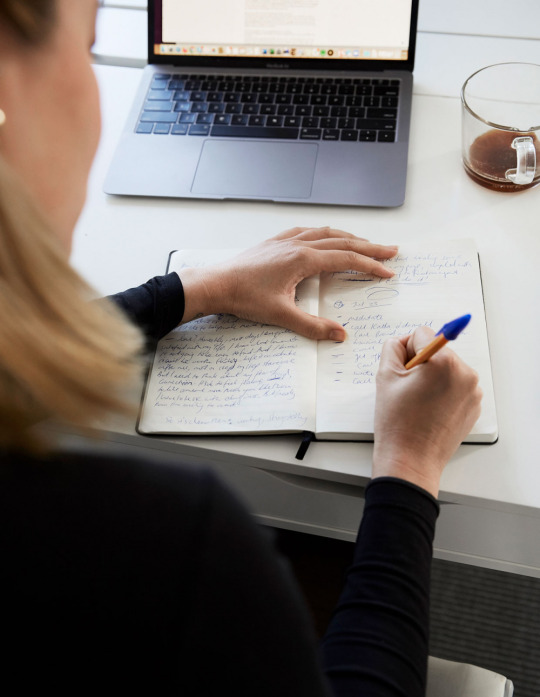
Bella is currently writes briefs directed to a European audience. Photo – Alisha Gore for The Design Files.
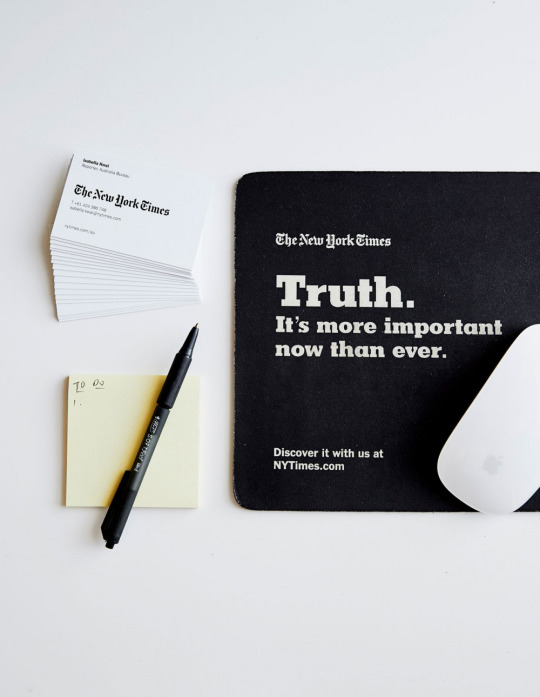
Bella started working for The New York Times in 2017 when the Australian opened. Photo – Alisha Gore for The Design Files.
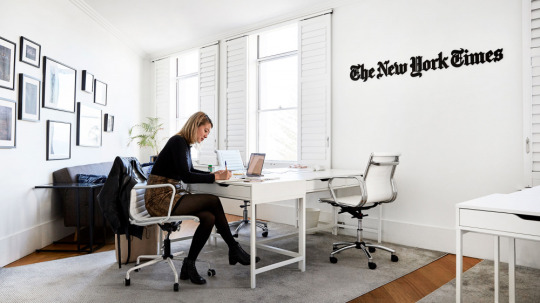
‘I think it’s important to know who you are, why you’re doing it and to find whatever it is that makes the journalism meaningful to you’, says Bella. Photo – Alisha Gore for The Design Files.
New York Times journalist Isabella Kwai does not do anything by halves.
Originally from Sydney, after school she got a scholarship to undertake a liberal arts degree overseas at Duke University in North Carolina. ‘It bought me some time to figure out what I wanted to do with my life, because I was interested in literally everything’, Bella reflects. She ended up double majoring in Public Policy and English Literature, figuring she could balance pragmatism ‘while also writing terrible short stories in Creative Writing that will never see the light of day’ – relatable. It wasn’t until her final year that she started to seriously explore journalism, a field that might just allow her to combine all her interests.
From there, Bella was part of Atlantic Media’s fellowship program, where she worked outside of editorial scope, more on the business side of things. But by this stage, Bella knew she wanted to write. Under the mentorship of ‘some very supportive editors’, she got her foot in the door by having a few clips published in The Atlantic. Not a bad start for a fresh university grad!
Although by now you might have figured out that Bella is naturally driven and ambitious, she credits this time in the US as an eye-opening experience. It gave her an appreciation for the hustle, as well as the privileges of working in Australia. ‘It’s not easy to grab a hold of someone on a Friday evening here – and that’s not a bad thing’, she says. ‘I remember being very inspired by people’s sheer self-belief and drive when I first moved there. At the same time, the glorification of the hustle is born out of things like wealth inequality, a lack of universal healthcare, and short maternity or paternity leave policies.’
Before The New York Times, Bella’s work experience more or less mirrors that of most in their early 20s – tutoring, working in cafes and cake shops, and odd freelance writing jobs. But when The New York Times opened its Sydney bureau in 2017, Bella immediately knew this was what she wanted to do. And now, she’s doing it!
The most important verb in my get-your-dream-job vocabulary is…
To start. I try to remind myself that the first step to getting something I want is to be in the running. It doesn’t even matter if the chances are long – they’re even longer if I never apply. After that, it becomes a series of problems to solve – who do I need to get in front of to make it happen? What are the strengths I have that will help convince them I’m the best person for the job?
I landed this job by…
Networking on top of my application. I was finishing up my fellowship at The Atlantic when I heard that the New York Times was opening a bureau up in Australia, and I knew immediately I wanted to be a part of that team. I applied through the site, and then I began stalking people I knew at the New York Times. I found one journalist who had been a former student at my university and asked if he might give me some advice over the phone. To my surprise, he did. And then I rustled up the courage to ask if he might mention to my current boss that I was very interested in the position. I remember this because I thought for sure I was pushing it, after this nice person had already agreed to a chat. But he did, and a few days later I had an interview and eventually landed the job.
Working for one of the world’s biggest news organisations in 2020 has been…
Surreal. Challenging. I was sent to Hong Kong for a month in February, supplementing our coverage when the pandemic was mostly contained in Asia, and at the time I was in awe of our reporters in Wuhan who were reporting while in lockdown there. Our reporters have also been on the frontlines of the protests over the killing of George Floyd and even within the media, there has been a reckoning over media and diversity. Sometimes it’s hard to shut out the news when you need to regenerate, but I feel like I’m witnessing first-hand a revolutionary moment in history in many, many ways.
A typical day for me involves…
I wake up. I drink coffee. I read the news. I drink more coffee. Right now, I’m helping cover the Europe morning briefing, which is a daily summary of the news aimed at readers in Europe, so I’ll make sure I’m across the biggest stories in the region and what we’ve written on them. We also have a global report on coronavirus news, so if Australia has major developments, which lately has focused on Victoria’s lockdown, I’ll write updates for that.
This is probably the most routine I’ve ever had. Before the pandemic, the hours could be more irregular, depending on the news, and we’d be out in the field more for feature stories. I just got back from the first reporting trip since the borders reopened, and that’s the most fulfilling part of the job because you’re really there as the story unfolds.
The most rewarding part of my job is…
Being able to bring something real and raw about the human condition – particularly if it’s something that’s been underreported – to an audience that might not otherwise come across it. I love that journalism is a kind of truth-telling that can broaden and open us to different worlds, and it’s so rewarding to be the conduit. For myself, the fact that people have allowed me into their homes, their lives, their intimate thoughts is such a privilege. It’s helped me understand people I’d never meet otherwise, challenged my preconceptions and opened my own world up. I’m a more grounded and empathetic person because of it.
On the other hand, the most challenging aspect is…
Staying resilient and optimistic in an uncertain industry. There are a lot of job losses in the industry right now, and given how competitive it can be, it’s easy to compare your own progress to others. So much of making it work is a combination of persistence, timing and a gate-keeper giving you a chance. I think it’s important to know who you are, why you’re doing it, and to find whatever it is that makes the journalism meaningful to you.
A lesson I’ve found useful is…
Better done than perfect. For me, any project worth doing, any new challenge worth taking on, the fear of not executing it perfectly can trip me up because I have an image of it in my head. But I’ve learnt that you can only ever prepare so much and to stop thinking and theorising and just get started. I recently came across RZA’s guided explorations and he puts it pretty well: Bite, or stop barking.
Also: if confused, just ask! Or you’ll end up apologizing to a linguist about confusing diphone with diphthong and, well, it’s just awkward for everyone.
Keep up with Bella’s work at The New York Times here.
0 notes
Text
Hell hath no fury
Guys this is a work of fiction, one that I'm especially proud of. Anti religion, atheist.
DISCLAIMER: Work of fiction. No offense intended.
A few hundred people wearing white entered the hall. They were quiet, solemn, and exceedingly polite to one another. None of them spoke very loudly, just in low tones. Not that there was a rule against loud speaking – it was just not in their nature. When they had all gathered in the hall, a sudden hush fell over them. Their blood ran just a little faster in their veins – not that their heartbeat mattered because it was physically impossible for them to die. When they had ascended, they had had the choice of any corporeal or incorporeal form, but it was an unspoken convention that they chose their human form out of respect for their Creator and His wisdom in the best form for the human mind.
As their blood ran faster, they experienced a strange feeling – a serenity and an ecstasy at the same time. Some felt that the feeling lasted a few seconds, while it seemed to last a few years to others. The feeling faded away slowly, so slowly that they could almost imagine it was still there.
It was the Presence of God that they felt, and though they felt the presence all the time, the sudden blood rush was the satisfaction of the Supreme Being in his loyal followers, which they felt at a periodic cycle. For some, it was a daily routine, while for others it was a monthly or an annual occurrence. Each soul in heaven experienced time as it wished to. No one would say “I want my day to be two Earth days”, but they automatically experienced time suited to them. They never had to dawdle to kill time or rush to make a deadline. The only measure of time was their perception of it.
As the feeling faded away, so did the walls of the hall. They found themselves out in the open. Nobody had measured how big heaven was – they had never felt the need to know. They had never felt crowded, nor had they occasion to complain about long distances (since they neither felt pain nor time).
Some beings moved away in groups, while others wandered off alone. They were able to speak, but did not need to use words as communication. Most of them still spoke to each other out of habit. Their world was in their minds. They could go through a normal daily routine, do a different thing each day, compose music, write books, play games, visit real or imaginary places, worship or do anything else that struck their fancy.
Most of them had ongoing projects, such as the composition of a song, writing of a novel, or any other mental activity that they performed habitually. They were never very complicated activities – there was no rule against complicated activities, it was just not in their nature.
Among them was not a single adulterer, murderer, homosexual, liar, prostitute, gigolo, or any wrongdoer of any kind. They were all persons who had led utterly blameless lives. Any small sins they committed, such as white lies, were either justified or properly repented for.
**************************************
“Andrew, let’s see, straight, no murders, negligence or otherwise, not a gigolo, never had relations with a prostitute, yes, yes, oh, but you entertained adulterous thoughts? And your child hasn’t been to Mass in, what, ten years? Had you heard of religious instruction? No, no, sorry, down you go.”
“Wolowitz, circumcised, well-behaved at the Bar Mitzvah, very good for you. All religious pilgrimages complete. Oh, but you were an astronaut? I’m sorry, that counts as building on the work of a known Helldweller. And wow, your wife is Catholic? Bye.”
“Meghna, hello, you seem like a good candidate. Only white lies, great. Did pooja even after you moved out, doctor, good profession, intelligent, and oh a known murderer died on your table, very good indeed. But oh, what’s this? You had premarital sex? From a rape? Hmm, that can be taken care of. *wink wink* Oh no. You disrespected your father? Shouted at him? Do you not know your place? So what if he didn’t think girls could be doctors? Sorry honey, no can do. Maybe you can do penance really hard down there and earn a chance to go up, huh?”
“Amir, welcome. What do we have here, beard correct length, treated all wives equally, etc. etc. Haj completed, regular namaaz, lawyer, all good. Ah, you have a weakness for your daughter, hmm? What a pure bond. Yes, really touching relationship, but oh she works as a receptionist now and doesn’t cover her face. You supported her, didn’t even try to excommunicate her. Ouch. Sorry. You’ll be going down.”
**************************************
A number of souls are scattered at the entrance to hell. They are wandering aimlessly, their minds overcome with sorrow at the prospect of hell. A few souls in human form walk briskly in and herd them together.
“Hello, yes good morning everybody. No, its okay, its okay, nobody will hurt you. Now, I understand that you have probably just had a very traumatic experience but I need you to focus. You can take any shape you like. You can be a human, a snail, a cucumber, a dog, a plant, anything. But whatever happens to your form, you cannot die. Obviously, this is because you’re already dead. You can even choose to remain without form, like this, as souls. Now a few smarty-pants will probably try to be a bear or a dragon or something, and feel free, but we find that a form that you are familiar with, such as the human form, is less of an extra thing to get used to. You will find that you can take form by concentrating on the image of the form you want in your head. Everybody, please take form, now. Its okay if you need a few minutes. Great, all humans. Form one, two, three four lines and follow me, please.”
“We will begin with a brief history. Hell was set up by Devil, for the people whom religion rejected. Now Dante and everyone else was right, there are different levels of hell – one for the really justified misdeeds like suicide, killing in self-defense, marrying outside your religion, adulterous thoughts, not succumbing to gender roles etc. Its kind of like Earth, without all the religious maniacs trying to make you feel bad about yourself. The second is for stuff that’s not yet quite considered justified even on earth – homosexuality, transgenderism, euthanasia, asexuality, atheism, nymphomania, nonviolent sociopathy. The third is for really bad stuff – bestialers, pedophiles, child murderers, genocidal people etc. Now you can choose where to be. The misdeeds are really a sort of guideline to help you decide, but you can be anywhere. Now, explore.”
Anastasia stayed in place uncertainly as the other souls slowly moved away. She decided to first add a little detail to her form. She had, on reflex, taken her own human form. She was short, yellowy complexioned with shoulder length dark brown hair to match her eyes. She wasn’t fat but she wasn’t thin enough to be considered hot. Looking down at herself, she increased her height by a few inches, added a curl or two to her hair, made her complexion a nice tan, and got green eyes with golden flecks. She increased her cup size and shaved off a few inches of tummy. She got rid of the bloodstained dress and dressed in capris and a T-shirt. She thought about a sexy dress, but decided she didn’t want the others to think she was trying too hard.
She looked down at herself appreciatively as she moved toward the first level. It seemed the safest. She shook her head at her own choice of phrase – safety didn’t matter, she could hardly die again. The level looked almost just like a regular city. She walked into what looked like a bar and ordered a drink.
The bartender looked her up and down, and said, “New, are you? The drink isn’t going to give you the courage you’re looking for and you can’t get drunk. Still want it?”
Anastasia considered. Finally, she nodded. She just wanted a familiar motion. She added as afterthought, “I don’t have any money. What do you use for money?”
The bartender laughed as he poured her drink and told her that there is no cost for anything in hell, “Your soul’s already damned, what good’ll money do?”
“Then why do you work? Why don’t you get everything for free and stay home?”
“Who says I work? I bartend because I like watching folks talk to each other, and occasionally have a newbie come talk to me.” He winked at her.
Anastasia felt her usual apprehension of strange men, but then decided she had nothing to lose. He couldn’t kill her, and if he tried to rape her, she’d just turn into a box or something. The thought of rape made her ask a question.
“Do you feel lust?”
He looked at her, genuinely interested, “That’s your second question as a newbie? Quite original. Well, you see, we’re souls. We can love. I can look at you and appreciate your body. I can think that I would like to have sex with you if we were human. But lust, my child, is a hormonal event. Fortunately, or otherwise, there are no hormones inside you. Your human form is like a façade. It is not the real thing. There are no actual veins and arteries and everything else. You imagine yourself to be so, and thus you are so. If you imagine yourself to be cut by what you imagine to be a knife, you would see blood, but not perceive pain, simply because you expect to see blood and thus subconsciously imagine it. Are you understanding?”
“Not really. Basically, I can’t feel lust or pain but I can love?”
The bartender nodded, disappointed that his theorizing had been wasted. “How do you know all this?”
“I have spent quite a lot of time here. In that time, I have observed and talked to people, and learnt things.”
“How long have you been here?”
“Let me see, when did you die?”
“2018”
“My, my, it will be fifty years next year. But I must tell you, here, everyone experiences time differently. You will not know whether a second has gone by or a year.”
“Then how did you know what I meant when I asked how long you have been here?”
“First, it’s a standard newcomer question. Second, I know because I can see your thoughts. Yes, yes, I can see the thoughts that you choose to share with me. When you share the question with me through your mouth, you intend to share it in its true sense with me, so it’s like you’re giving me permission to go in your head for the purpose of that one question only. Some people just have open thoughts that anyone can see.”
“Basically, if I let you, you can read my thoughts?”
“Yes.”
“So why doesn’t everyone communicate like that instead of speaking?”
“Some people do it out of habit. Others communicate like this.”
“I see. So, I can be a bartender too, if I want? I don’t have to send out resumes or do interviews?”
“Yeah. But unless enough people imagine your bar to exist, you’re just playing bartender in thin air and that doesn’t sound like fun.”
“But why would anyone imagine my bar to exist?”
“You tell them to? They like hanging out with you as a bartender?”
“I see. Thank you.” Anastasia turned and left.
She didn’t like it when people implied that she should know things that she didn’t know. It rarely happened. She was, after all, in a different… dimension? Planet? How did it matter?
She decided to continue exploring. The first level of hell had really no semblance of social structure. People were just scattered about, doing their own thing in their heads. If Anastasia tried, she could see some of their worlds. They were mostly going about a daily routine. Anastasia thought most people would imagine themselves to be rich, but she kept forgetting that they didn’t have to eat, could look however they liked, and couldn’t die. What good was money here, really?
It was quite sad. People imagined married lives with people who had rejected them in life, or who continued to live while the helldweller was dead. They imagined lives with family members who were dead or estranged. Quite a few people who were probably from orthodox communities dreamt of a married life with their loved one and acceptance by their family. Infertile people dreamt about having kids. Some took revenge against the people who killed them, or the people they thought killed them. A lady who had died of cancer at seventy repeatedly shot her doctor because she thought he had been negligent.
Going around, Anastasia thought this wasn’t so bad. Where was purgatory? The legendary inferno? The red guy with horns, a tail, and a pitchfork who she had been taught to fear? She could get used to this. This was actually quite peaceful.
As she ventured into the second level, she began to see the beginnings of organized society. People were in groups, adding their bits and pieces to the collective imagining. Some were playing Earth games like scrabble with their imaginations.
Some created imaginary towns and cities and controlled the inhabitants. A man who had probably been a paraplegic created a hospital with every medical facility he could think of, which, of course, allowed euthanasia. An adulterer created a world without the institution of marriage – just what Earth people would call open relationships. Homosexual men and women fantasized a world where their orientation was normal – not bold, hated, illegal, frowned upon, used as a slur, or drew stares. A world where marriage was not assumed to be between man and woman and nobody would assume that any more than they would assume what someone else ate for lunch. Transgenders imagined a world where they could wear and behave as they liked.
These worlds connected to each other, because of the social nature of the second-level helldwellers. They did not make one continuous world, but they could, with a little effort from the helldwellers. Some were open and friendly to one another. Others had worlds of their own and preferred to be alone. Still others alternated. Everyone just did what they wanted. It did not hurt any of the others. They were all quite happy in the moment, although they felt sadness when they thought about their Earth lives.
As expected, there was a lot of hate for authority figures – a gay man had a dartboard with his father’s face on it. Anastasia later found out that the man had been sent to Catholic boarding school to ‘cure’ him of his ‘disease’ where he had been picked on, ridiculed, and traumatized to the point of needing intensive therapy. He developed an inferiority complex and social anxiety. He stopped growing from the age of ten to fifteen, and grew a few inches when he started going to therapy after the death of his father. His father was in heaven for having taken appropriate steps to weed out the boy’s ‘disease’, having asked forgiveness for it, and having attended Mass every Sunday for the better part of five decades.
A woman had a torture cell in her world for a Minister of State, her entire joint family, and a few police officers. Born in an affluent orthodox Brahmin Indian family, she had fallen in love with a lower-caste scholar. As soon as her family found out, they promptly had him killed. The Minister was a close family friend who had kept the killing out of the courts and the newspapers, and the police officers, instructed by him, had quietly looked the other way. Her twenty-five-year old lover with dreams of the Nobel had been beaten to a pulp and left dead in the sewers like vermin. She shot herself and her father after getting a hold of his gun.
Nearly everyone had a person that they hated with all their soul. It was not always for such serious things – mothers-in-law who had demanded that her daughter-in-law not pursue a career, drunken good-for-nothing husbands, disowned family, etc.
Anastasia liked the place but decided that it would take a little getting used to. She ventured into the third level of Hell with a sense of foreboding and gasped when she saw it. Here was the inferno that had inspired Dante. Here was the hellfire. The people were of all sorts – some looked like investment bankers and others could barely pass for human. Anastasia’s stomach turned as she realized that the hellfire was in their minds. They had created this, and their perversion had made them lose control of their own imaginings. The air was oppressive with heat and smoke – although there was a fire and a burning sensation, nothing actually happened to your body. The burning sensation, obviously, was not a physical one. Anastasia dimly registered that the feeling was similar to the burn of shame.
She stared, transfixed, at the visions created by their minds. One man held a little girl in his hands, she so small and he so big that his hand covered her torso. She could speak, but with a lisp, the picture of innocence. She wore a pink frock that just covered her behind which rode up as the man sat her in his lap. She turned, wide-eyed and smiling, to the man. With one gesture, the man ripped off the frock at which tears started running down her cheeks and she tried to free herself. Dirt from his hands smeared her chest as his fingers poked at nipples that could have been a boy’s. The large hand cupped her tiny bottom and as his fingers forced their way in between the child’s butt cheeks, Anastasia screamed. She resisted her impulse to try and save the child, since she knew it was a figment of his imagination.
She turned and ran.
0 notes
Text
~31st January 2019~
Leaving El Chalten with a heavy heart as we drove away from one of the most identifiable mountain range. While looking longingly towards the mountain, I was thinking of how I could spend a couple of months here without spending my entire savings.
We had a few camping nights to look forward to before we reach Buenos Aires. It was a long drive before we reached a nice seaside town, Puerto San Julian, where we camped in a municipal campsite. It’s a cute little place with a beach and a promenade for walking and jogging. It was pretty much dinner, sleep, breakfast and on the road again.
~1st February 2019~
Long drive days are a killer to the body, so most people tend to just sleep or unintentionally dozed off. The next municipal campsite was in Camarones, a relatively long drive and I can see that everyone was getting a bit tired it. Overlanding with a large group of people was becoming my least favourite things to do.
Once we were at the campsite, it was routine to put up the tent then dinner and bed. There was excitement in the air that night because we’ll be visiting a penguin colony the next day before we head over to Puerto Madryn.
~2nd February 2019~
Breakfast was nice and early so that we were ready when the guide for the penguin colony arrived. The guide was a nice lady looked like she’s near retirement or retired and decided to educate people about the penguin colony as a guide. She spoke Spanish only, so Oli did the translating for us with Kylie helping from the truck cab.
The colony lives within a protected national park for wildlife like guanacos, hares, armadillos, rheas and many others apart from the penguins. There were broadwalks where the penguins lives, allowing visitors to get closer to them without getting in their way of life.
The penguins are cute and seemed so familiar with the presence of people around them. They just get on with their daily grind of digging out a home, protecting it and waddle to the beach to go fishing for food. We stayed there a while, enjoying the wildlife around us, the walk and being out of the truck.
On the way back, we were able to sit on the roof seats again to enjoy the surroundings. It was great to see people in other vehicles that passed us waving and looking in amazement of the truck. We dropped the guide back at the campsite and continue with our journey to northwards to Puerto Madryn.
We visited the travel agency on the way into town and arranged activities for the next day. It’s a large seaside town with everything you expect such as restaurants, ice cream stalls, beach bars, travel agencies, beach sports and a lot of people.
It was quite late and dinner was cooked in the dark so was putting up the tent. I saw that the campsite was busy and there were a couple of mini parties going on, I kinda knew it was going to be a restless night.
~3rd February 2019~
The campsite is on the edge of town so I thought it’ll be a bit quieter, nope! That didn’t help when people partying till the early morning on the campsite with no rules visible for partying till late night.
Most of us are heading off to do snorkelling to see the sea lions. The tour office kitted is out with two layers of wetsuits that seemed too tight and wet shoes. We were led out o the office towards the beach to board the boat used to take us out to sea. It didn’t take us long to get to the location where the sea lions were but still, a few people were getting a bit sick from the motion of the boat.
We were further kitted out with hoods, fins and snorkels before jumping into the water. It was great to be so close to the sea lions but none were interested in playing that day. Instead, they were just lounging on the rock sunbathing and stretching out to chill. The sea was a bit rough that morning and even though I know I can swim pretty well with fins, I was staying near the guides and floats.
On the way back, there were some green faces that looked like they were ready to empty their stomach at any time and one finally did when we were back on the beach. It was then a race to get the wetsuits off so that we could go to the loo. What a relieve to make it?!
The rest of the day was just chilling out with few people lunching and bar hopping. We met a lovely artist backpacking with a puppy, looking for a ride out of town so that she could hitchhike to Buenos Aires. I knew the answer would be no on our truck for many reasons yet some thought it would be possible. I saw the disappointment in her face when she was given a no on the lift out of town.
The truck was broken into when it was parked at a supermarket for cook group shopping. One of the bags got stolen was mine with laptop and money in it. It was fortunate that someone saw what was happening and called the police. The thieves didn’t manage to go through any of my stuff so everything was still in the bag. I’ve learnt a few things from this incident about myself and a few other facts that I have to keep in mind for the rest of the trip.
~4th February 2019~
We’re camping for the last night for this leg of the trip from Santiago to Buenos Aires then hotel in the city where the next trip starts for Rio de Janeiro. It was the usual routine in the morning, all packed and hit the road for a long drive day.
Our campsite for the night was in Bahía Blanca en route to Buenos Aires. The campsite with a pool but the facilities would make you cringe, that’s how I remembered it. Oh…I was more than happy to skip the shower when I peeked at the cubicle.
For the first time I felt like I’m supposed to be somewhere else doing something else. Restless, that’s the word. I’m restless and the world around me suddenly felt foreign because there’s no purpose of me being there. Made me think and force me to focus on why I’m on this trip in the first place.
After a quiet evening to myself, tiredness seeped in and I fell asleep like a baby. My brain probably had enough by then.
~5th February 2019~
Buenos Aires, this was the first time I was looking forward to a city. Perhaps it’s a transition between two trips which will give me time to get my head together before the start of the trip to Rio de Janeiro.
Another long drive day and we were all too familiar with the routine stops for loos and refreshments. When we reached the city, everyone was happy to be checking in to a hotel to recoup from all the camping we did. Roomie with Emma, finishing the trip how we started by sharing a room.
Dee, Emma and I went out for a simple dinner that night then back to the hotel for a good night sleep.
~6th-8th February 2019~
There were a few things I needed to do in BA before we start heading to Uruguay. First thing first was to get my yellow fever vaccination for Brazil then see the city. It was easy enough to get it but the language barrier made it a bit tricky.
So, I went to the clinic early in the morning on the 6th and they told me I must have a prescription from the doctor. They recommended a doctor for me, gave me the wrong address and direction but lucky that I managed to find it. I had to pay for the prescription and it was still cheaper than getting it in the UK. When I went back to the clinic with the prescription, they told me I had to come back the next day midday for the jab. So I went back, paid a small charge and all done within 15mins.
The rest of the time in BA was spent exploring and scheming to do ‘not touristy’ things, which was hard. Walking around the different sectors in the city to get a feel of the cultures and history. To start was a free walking tour after visiting the clinic, then I was looking for something fun to do to end this spell of being tired of cities. Since I had to be back at the clinic at a certain for my jab, I planned to go to Recoleta cemetery and do a fun task of finding and taking photos with cartoon characters around Puerto Madero area.
On the way to the cemetery there is a beautiful bookstore on Av Santa Fe called El Ateneo Grand Splendid that certainly worth visiting. A converted theatre with its stage is now a coffee shop, the features preserved and lined with bookshelves. There was still a feel of the grandeur of a theatre but a bit less than I expected. Now Recoleta cemetery is one impressive place to visit. I love cemetery for its peacefulness (apart from the tourists) and it reminds me how fragile and temporary life is.
I appreciate the present because I knew death from a young age and the Ripper felt like an angel looking after me since father passed away. My closeness with death at times is questionable but the introversion reflective state of mind helped me stay in the present, appreciating the moments I have and live the life. I was wondering whether the feeling of contentment and fulfilled life might be temporary and it’ll just dissipate as I travelled the continent. It didn’t happen. Being in the cemetery reinforced that and if the Ripper decides that it’s my time to go then it’s time to go, hopefully in a peaceful state as father did years ago.
It was a nice stroll from the cemetery to Retiro area and back to the clinic before going off on a hunt for cartoon characters. When I crossed the bridge to port area, the scenery reminded me of Dublin with new buildings lining the canal. Once I found the first cartoon character, it was the thrill of the chase for the rest of them that kept me going. It was a fun non-touristy thing to do, something different from the normal sight-seeing and I have photo evidence of it all!
Buenos Aires…saying goodbye to some of the quirkiest people I’ve ever met and the start of the last leg of this journey around Latin America. Travelling with 22 other people taught me a lot about myself and behaviour in general. BA to Rio, there were 13 of us plus Kylie and Steve (Lewis left us for Santiago to do another trip to Ushuaia). The dynamic changed again with people leaving and joining the group.
Next stop, Colonia where we crossed the border to Uruguay.
Argentina: Puerto San Julian-Buenos Aires ~31st January 2019~ Leaving El Chalten with a heavy heart as we drove away from one of the most identifiable mountain range.
0 notes
Photo
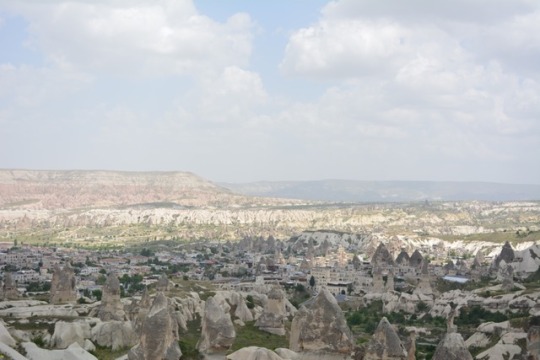
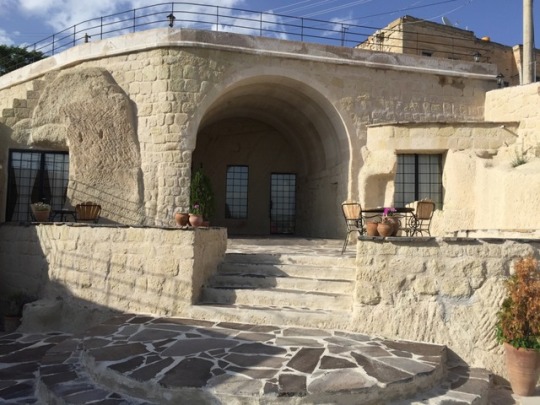
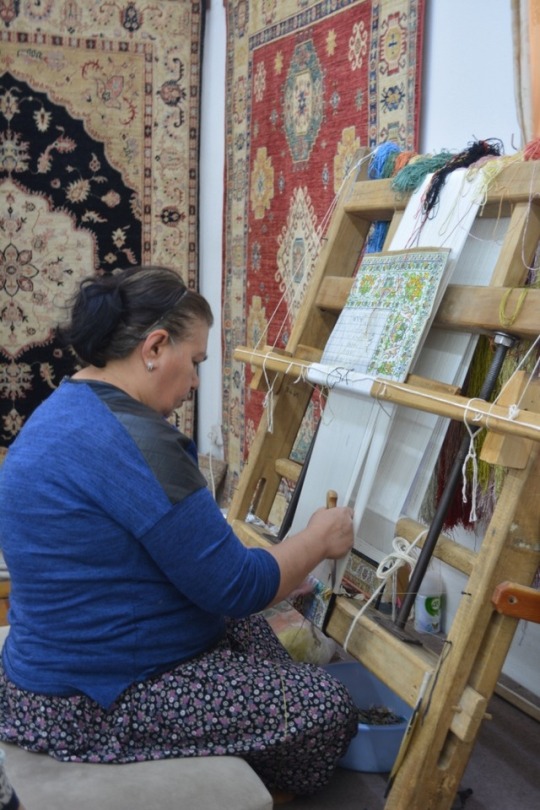
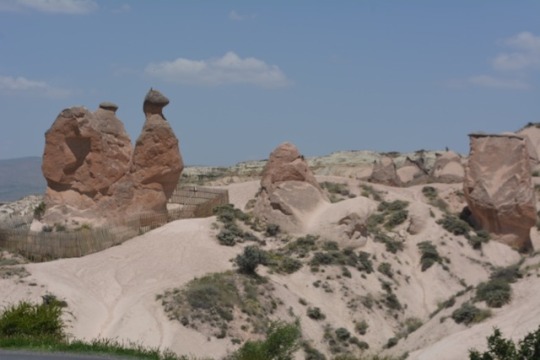
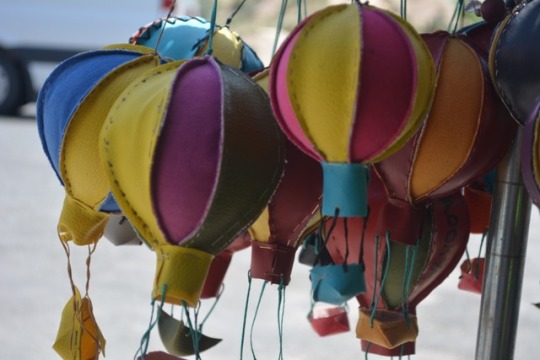
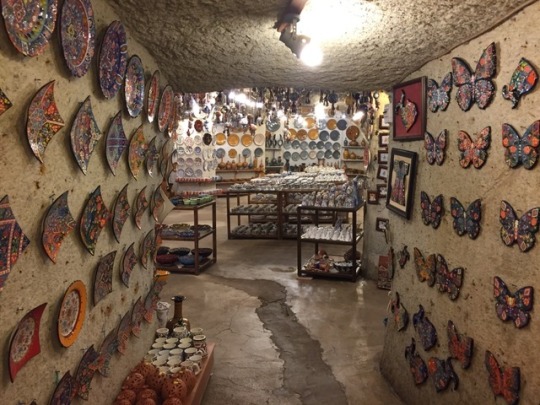
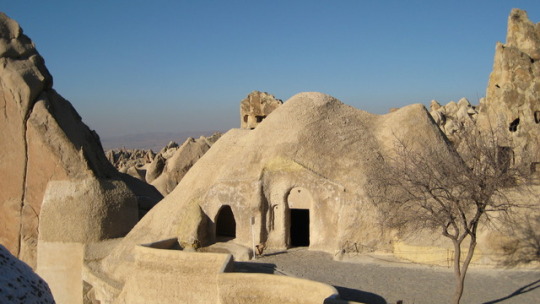

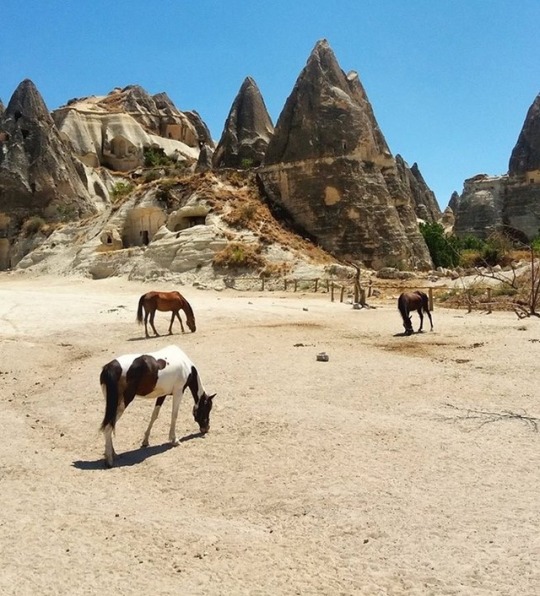
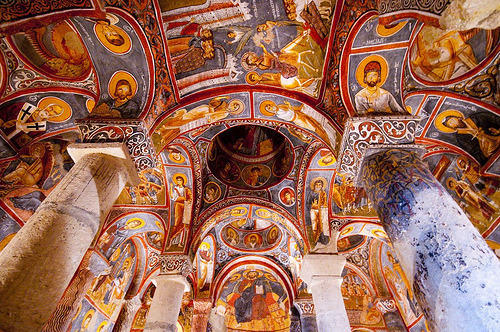
Travel Diaries 3: Cappadocia, Turkey. (May 2016)
Finally, after our stay in the rich and extravagant Istanbul, we had to bid farewell and leave for a small town, Cappadocia. It was hard for me to say goodbye to the city because it had created a special place in my heart in such a short span of time. I was already missing the charming people, wonderful places, monuments and vast markets and the entire feeling of being in the city. My mood was a little down before we touched down in Urugup, the city where Cappadocia was located. The place is famous for its geographical features of rock formations and caves that are a result of the volcanic eruptions of the past. In fact, we actually stayed at a cave hotel that had real cave rooms. Their age ranged from about 200 to 5000 years old. The room in which I was staying was 4,500 years old, which was fascinating to know, as it had a huge history linked to it.
We met some of the friendliest people in that city. They knew how to treat foreigners and tourists and teach them about their country’s history. We had had conversations about Bollywood and how Turks respected and admired the Indian culture. They had also talked about one of the main occupations being carpet making. Most women were hired to do the sewing and make carpets that had impeccable patterns and designs; some even looked like portraits. This was one of the main sources of income in many households.
They told us about numerous underground cities used by early Christians as hideouts to protect themselves during war. They also used caves, as shelter and houses and they were all hand-made as the rock formations were of relatively softer material that was easy to scrape and shape. They are called the ‘tufa’ rocks; red ones made of iron oxide, yellow ones of sulphur and the black ones of basalt. Later on, they were also used for vineyards due to the suitable and constant temperature inside the caves that was suitable for human survival also. Thus, the rocks and caves had a great utility. In fact they were still used as houses by many families even in the 21st century.
One of the many tourist attractions was the hot air balloon ride that would take tourists and visitors all around the town to have a breathtaking 360 degree view of the caves, skyline and the natural beauty of Cappadocia. Unfortunately due to the restriction of time we couldn’t experience it but that leaves another reason to visit the place again.
On the first day of our tour, we got to visit the pigeon valley. The region is located in the center of the Anatolian Region of Turkey, with unusual rock formation that were a result of the erosive rains and winds along with the rock formations that were formed by the volcanic eruptions that had occurred 2 million years ago. Millions of pigeons in the area attract numerous visitors every year. It is one of the longest valleys located between the Goreme and Uchisar districts in Cappadocia.
We also got to visit a few churches like the Church of Barbara, built in the 11th century that was constructed to imprison a martyr called Barbara to protect her from Christian influence. She continued her faith and was killed by her father along with the 11th century Chapel of St. Basil that also contains many architectural splendors and frescoes of Jesus; Mary and Baby Jesus, and saints Theodore, George and Demetrius. There were many other churches named as per their shapes example the apple church aka Elmalı Kilise. These were together called the Goreme churches because they are located in the city of Goreme.
These frescoes were painted depictions of different events of Christ’s life and were made out of vegetable pigments. Thus, they’ve been in very good shape over centuries. The various churches that are again scraped out of the rock formations consist of these frescoes that depict the different stages of Jesus Christ’s life. It was intriguing to learn about the origin of Jesus and Christianity. The real exquisiteness of artistry in those churches made me appreciate the Christian history even more because now I could say that I had proper and adequate knowledge about the religion.
We later visited an underground city where I learnt pottery from a pottery guru. There, they taught us about the Turkish ceramics and their significance. The way the ladies painted the pots with free hands looked so effortless but it was pure perfection. The carvings and the drawings seemed as if they were machine made but it was magical how they effortlessly glided their hands over the glass leaving impeccably attractive designs. They explained how machines were replacing human labour but they believed in independence from technology. The underground cities were vast and deep. Some might feel claustrophobic in such conditions but the endlessness of the gullies and underground caves left me speechless.
The next day we spent discovering the hotel where we were staying and generally enjoying the sunny weather. My parents read their books on the terrace and I continued with my photography and writing. I loved how we could have some time to ourselves between all the travelling. The caves were not very WiFi friendly as they prevented radiation of any kind giving us ample time to take some time off from the virtual world and enjoy the beauty that the nature had to offer.
I enjoyed editing my pictures and editing drafts for my blog with a cup of the famous Turkish tea. It was surprising how the tea was served in such a small quantity yet it had a strong influence. Slowly, the new experiences after Istanbul were growing on me and the hangover of the previous city was wearing off. The last day was spent spending quality family time talking about how our daily routines took up so much time that we could hardly appreciate the beauty of life.
Here, native families were seen talking and laughing over a cup of tea and a plate of Turkish snacks. It was nice to see that even not very well-to-do families seemed to be satisfied with what they had and knew how to appreciate time spent with their loved ones. This helped my parents and I cherish each other even more. We realized that such experiences were nothing without our loved ones.
Even though Cappadocia was a small city, it had much to offer. The simplicity and accepting nature of the people is what we could all absorb something from. They didn’t need modern technological facilities or materialistic gains to be happy. The common feature among everyone that we met was that they were all laid back and extremely comfortable with who they were. They didn’t have anything to prove or show unlike most city people. Something about them was so welcoming and warm. They taught us that even though they didn’t have a lot, they still managed to make the most out of their limited resources. Unlike the previous city, the people of the town lived a relatively slow paced and pleasing life. They earned enough to keep themselves healthy and content. In the modern world where everyone is running and is not ready to slow down, the town people showed that one could live an equally happy life without running after materialism and giving more time to humanity, love and acceptance.
We had earlier met one of the natives who had talked to us about how their people were proud of their heritage and traditions and how it inspired them to not only work for their town but also for other humans. They strongly believed in humanity and equality and were not afraid to show it and pass it on to whoever came to visit their home.
They had a sense of compassion and empathy that made them stand out. Even if they met a complete stranger, they wouldn’t think twice before showing him just as much love as they would show to a family member. It wasn’t just a place that had rich history but also people who had so much to give unconditionally. The small yet wonderful town will always have a special place in my heart.
With that came the end of our vacation in Turkey. Although I knew that I would miss Turkey a lot, I was still excited for what Greece had in store for us. So, we bid farewell to everyone who had made our experience in the town unforgettable and moved on with the rest of the vacation.
0 notes